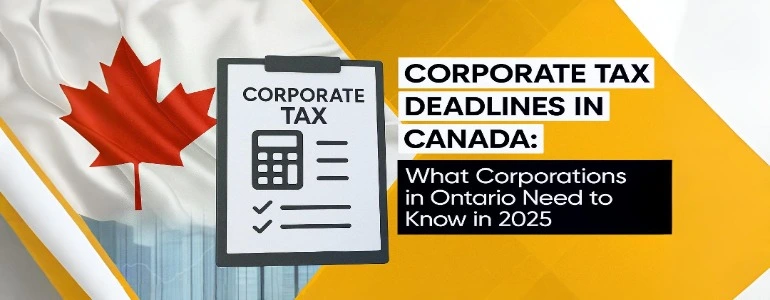Canadian businesses and self-employed individuals have specific tax deadlines to meet in 2026. These include key dates for filing returns, paying balances, and submitting information slips to the Canada Revenue Agency (CRA). Missing a deadline can lead to penalties, interest charges, or ineligibility for certain tax benefits.
Key dates to know:
- Self-employed individuals must file by June 15, 2025, but payment is due by April 30, 2025.
- Corporations must file T2 returns within six months of their year-end.
- GST/HST and payroll deadlines vary based on your reporting frequency.
- UHT returns are due by April 30, 2025, for properties owned as of December 31, 2024.
Need help filing your corporate return? Choose Bestax for reliable, on-time T2 filing backed by tax professionals who know CRA requirements.
Here are the corporate tax deadlines in Canada that you need to be aware of:

1. Tax Deadlines for Self-Employed Individuals
If you’re a freelancer, contractor, or operate a sole proprietorship, here’s what you need to mark in your calendar for 2025:
Income Tax Return Filing Deadline
- June 15, 2025
- If your spouse or common-law partner is also self-employed, the same deadline applies.
- Exception: If your income in 2024 was primarily from a tax shelter investment, your filing deadline is April 30, 2025.
Payment Deadline
- Any balance owing for the 2024 tax year must be paid by April 30, 2025, even though the return is due in June.
Instalment Payments
If you’re required to pay taxes by instalments, your due dates in 2025 are:
- March 15
- June 15
- September 15
- December 15
Failure to make timely instalment payments can result in interest charges.
Important Point: If a tax filing or payment deadline falls on a Saturday, Sunday, or a public holiday recognized by the CRA, your return is considered filed on time if it is received or postmarked on or before the next business day.
2. Tax Filing Deadlines for Corporations in Canada
Corporations, including those based in Ontario, are subject to a set of distinct tax rules and due dates.
T2 Corporate Income Tax Return Filing
- Due six months after your corporation’s year-end.
- For example, if your year-end is December 31, 2024, your return is due by June 30, 2025.
Special Deadline for Canada Carbon Rebate for Small Businesses
- Canadian-controlled private corporations (CCPCs) that:
- Had fewer than 500 employees in 2024, and
- Employed at least one person in a designated province
→ Must file their 2024 corporate income tax return by July 15, 2025 to be eligible for the rebate.
- Had fewer than 500 employees in 2024, and
Balance-Due Date
- Generally two months after your tax year-end.
- If you’re a CCPC claiming the small business deduction, and meet specific CRA conditions, your balance is due three months after year-end.
Instalment Payments
- Based on your previous year’s tax payable.
- Most corporations are required to remit monthly or quarterly, depending on their structure and size.
3. Payroll Tax Deadlines for Businesses with Employees
If you have employees, even just one, your payroll obligations must be met on time.
T4, T4A, T4A-NR, and T4A-RCA Filing
- File these information returns by February 28, 2025, for the previous calendar year (2024).
Remittance Schedule
- Based on your Average Monthly Withholding Amount (AMWA) from two years ago.
- CRA classifies businesses as:
- Regular remitters
- Accelerated remitters (Threshold 1 or 2)
- Regular remitters
- Each group has different remittance frequencies—monthly, twice-monthly, or up to four times per month.
For accurate scheduling, check your AMWA and CRA account status at canada.ca/payroll-file.
4. GST/HST Filing Deadlines for 2025
Whether you’re a sole proprietor or a corporation, if you’re registered for GST/HST, your deadlines vary based on your reporting frequency.
Monthly Filers
- File and pay by the end of the month following the reporting period.
Quarterly Filers
- File and pay one month after the quarter ends.
Annual Filers
- Filing Deadline: Three months after fiscal year-end.
- Payment Deadline for Self-Employed with a Dec 31 Year-End:
- Payment due: April 30, 2025
- Filing due: June 15, 2025
- Payment due: April 30, 2025
Instalments
- Due within one month after each fiscal quarter ends.
- Use CRA’s instalment payment calculator on My Business Account or Represent a Client portal to stay on track.
5. Underused Housing Tax (UHT) Filing Requirements
Introduced recently, the Underused Housing Tax (UHT) is a 1% annual tax on the ownership of vacant or underused residential property in Canada.
Who Needs to File?
- Affected owners include:
- Foreign owners
- Some Canadian corporations
- Trustees and partners
- Foreign owners
Deadline
- UHT returns must be filed by April 30, 2025, for each property owned on December 31, 2024.
Consequences of Non-Filing
- Significant penalties and interest apply for late or missed UHT filings—even if no tax is owed.
6. Late Filing Penalties and Extensions
Failing to file on time can be costly. Here’s what you should know:
Late Filing Penalties
- Individuals: 5% of the balance owing, plus 1% for each month it’s late (up to 12 months).
- Corporations: Similar penalties, with increased rates for repeat late filers.
- GST/HST and Payroll: Additional penalties for missed remittances.
Extensions
- CRA may grant tax extensions under certain conditions, but they do not waive interest.
- To apply, contact CRA or consult a tax advisor before your due date.
Best Practices for Staying on Track
Staying on top of tax deadlines requires a proactive approach. Missing a date, even by one day, can result in penalties, interest charges, or delays in processing returns and credits. Here are some practical steps Canadian businesses and self-employed individuals can take to stay organized throughout the year:
1. Set Calendar Reminders for All Key Deadlines
Mark all important CRA deadlines in your calendar, including:
- Instalment payment dates (March 15, June 15, September 15, December 15)
- Filing deadlines for income tax, T2 returns, GST/HST, payroll, and UHT
- Year-end dates specific to your business
Use automated calendar tools (Google Calendar, Outlook, or project management apps) to set reminders a few weeks before each due date.
2. Use a Cloud-Based Accounting Tool with CRA Integration
Modern accounting platforms like QuickBooks, Xero, and Wave can:
- Track income, expenses, and GST/HST
- Sync with your CRA account
- Automate reports needed for corporate tax filing
These tools help reduce manual errors and keep your financial records up to date, which makes tax filing much easier at year-end.
3. Work with a Professional Accountant or Tax Advisor
Even if your business is small, hiring a tax professional like accountants at Bestax can:
- Ensure accurate and timely T2 filings
- Help you identify eligible deductions and credits
- Reduce the risk of CRA audit issues
Professional accountants at Bestax stay current with CRA rules and deadlines, so you don’t have to. This is especially important for corporations, businesses with employees, or those claiming specialized rebates..
4. Monitor Your CRA Business Account Regularly
The CRA’s My Business Account portal provides real-time updates on:
- Filing statuses
- Instalment due dates
- Correspondence from the CRA
- GST/HST and payroll account balances
Checking this portal regularly ensures you don’t miss important alerts or changes in your filing obligations. If you work with an advisor, they can also access your account through the “Represent a Client” service.
Need a Reliable Tax Accountant for 2025? Choose Bestax.
Bestax is a trusted tax accounting firm specializing in corporate tax return filing, self-employed tax support, and CRA compliance. Whether you’re managing a corporation, a growing small business, or freelance income, our team ensures everything is filed accurately and on time.
- T2 corporate tax filing
- GST/HST and payroll returns
- Instalment tracking and reminders
- Support for CRA reviews or letters
Contact Bestax today to get started with a professional tax accountant who knows Canada’s rules inside and out.
Quick FAQs
When is the deadline to file corporate tax in Ontario in 2025?
The deadline to file a corporate tax return (T2) in Ontario is six months after the end of the corporation’s fiscal year. For example, if a corporation’s year-end is December 31, 2024, the T2 return must be filed by June 30, 2025. This filing deadline applies to all corporations in Canada, including those based in Ontario.
What are the T2 filing requirements for businesses in Canada?
All resident corporations in Canada must file a T2 return every year, even if there is no tax payable or the corporation was inactive. The return must include financial statements, required schedules, tax calculations, and any applicable claims for deductions or credits. Corporations with gross revenues over $1 million are required to file their T2 electronically using CRA-approved software.
How to file your T2 return on time?
To file your T2 return on time, you need to know your corporation’s fiscal year-end and ensure that the return is submitted within six months of that date.
What happens if I miss the T2 filing deadline in Canada?
The CRA charges a late filing penalty of 5% of the unpaid taxes as of the filing due date, plus an additional 1% of the unpaid amount for each month the return is late, up to a maximum of 12 months.
How late tax filing can affect Ontario businesses?
Late tax filing can negatively impact Ontario businesses by triggering late filing penalties and interest charges. It can result in the loss of eligibility for tax credits or government programs such as the Canada Carbon Rebate for Small Businesses. Additionally, a history of missed deadlines can increase the chance of being selected for a CRA audit or compliance review.
How to avoid late filing penalties for corporate taxes in Ontario?
To avoid late filing penalties, corporations should track their fiscal year-end and ensure all T2 returns and payments are submitted on or before their due dates.
What happens if you miss corporate tax deadlines in Canada?
Missing corporate tax deadlines in Canada can result in late filing penalties, daily interest on unpaid taxes, and loss of access to credits or programs. Continued non-compliance can lead to increased penalties and legal action.
Disclaimer: The information provided in this blog is for general informational purposes only. For professional assistance and advice, please contact experts.




